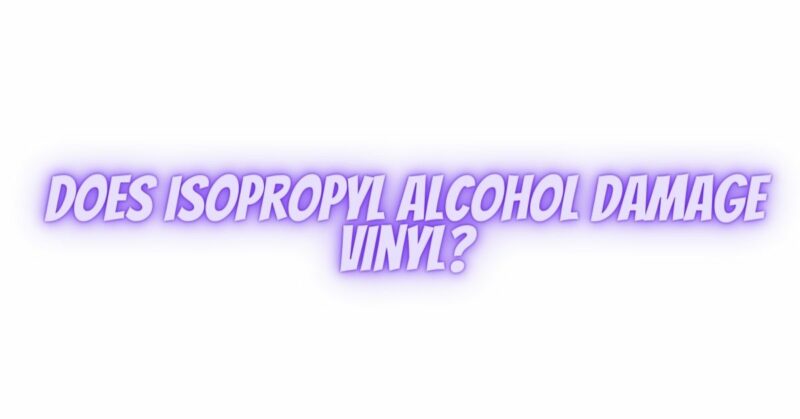Isopropyl alcohol is a commonly used cleaning agent for a variety of surfaces and materials, including vinyl records. However, its use on vinyl has been a subject of debate and concern among collectors and enthusiasts. In this comprehensive guide, we will explore the effects of isopropyl alcohol on vinyl, when and how it can be safely used, and alternative cleaning methods to consider.
The Concerns About Isopropyl Alcohol
Vinyl records are made of a PVC (polyvinyl chloride) compound, which is known for its sensitivity to certain chemicals and solvents. Isopropyl alcohol, a clear and colorless liquid often used as a cleaning agent, can have both positive and negative effects on vinyl records. Here are the key concerns:
1. Vinyl Softening or Deterioration:
PVC can soften or deteriorate when exposed to certain chemicals, including some types of alcohol. Prolonged or repeated use of isopropyl alcohol on vinyl may potentially lead to the softening of the vinyl material, which could affect playback quality and even damage the grooves.
2. Residue and Streaks:
Improper use of isopropyl alcohol can leave behind residue or streaks on the record’s surface, which can negatively impact playback and overall audio quality.
3. Label Damage:
Isopropyl alcohol can also damage the labels on vinyl records, causing them to fade or become discolored.
Safe and Effective Use of Isopropyl Alcohol on Vinyl
While there are concerns about the potential negative effects of isopropyl alcohol on vinyl, it can be safely used in some situations with proper precautions:
1. Dilution:
If you choose to use isopropyl alcohol on your vinyl records, consider diluting it with distilled water. A recommended mixture is typically around 25-30% isopropyl alcohol and 70-75% distilled water. This dilution helps reduce the risk of vinyl damage.
2. Gentle Application:
When applying the diluted alcohol mixture, use a soft, lint-free cloth or a specialized vinyl cleaning brush. Gently wipe the record in a circular motion, following the grooves.
3. Quick Drying:
After cleaning, allow the record to air-dry completely before playing it. Ensure there is no residual cleaning solution left on the vinyl.
4. Infrequent Use:
Use isopropyl alcohol for cleaning vinyl records infrequently and only when necessary. Routine cleaning with a dry brush or an anti-static brush is usually sufficient for maintenance.
5. Spot Cleaning:
Consider spot cleaning with isopropyl alcohol only when you encounter stubborn stains or contaminants that other methods cannot remove. Apply the diluted alcohol sparingly to the affected area.
6. Rinse with Distilled Water:
After cleaning with isopropyl alcohol, rinse the record with distilled water to remove any remaining cleaning solution and prevent residue buildup.
Alternative Vinyl Cleaning Methods
If you are concerned about using isopropyl alcohol on your vinyl records, there are alternative cleaning methods to consider:
1. Carbon Fiber or Anti-Static Brushes:
Regularly use a carbon fiber or anti-static brush to remove dust and debris from the record’s surface. These brushes are safe and effective for routine maintenance.
2. Record Cleaning Machines:
Invest in a record cleaning machine that uses a gentle vacuum and specialized cleaning solution to deep-clean vinyl records without the risk of damage.
3. Commercial Vinyl Cleaning Solutions:
Explore commercial vinyl record cleaning solutions specifically designed for safe and effective use on vinyl records. These solutions are formulated to minimize any potential harm.
4. Professional Cleaning Services:
Consider professional record cleaning services, especially for valuable or rare vinyl records. These services use specialized equipment and cleaning solutions to restore records to their optimal condition.
Conclusion
Isopropyl alcohol can be used on vinyl records, but it should be used with caution and in moderation. Diluting the alcohol, using gentle application techniques, and ensuring proper drying and rinsing are essential precautions. However, there is always some level of risk associated with using alcohol on vinyl, so it’s wise to explore alternative cleaning methods, especially for valuable or cherished records. Ultimately, the key is to strike a balance between maintaining the cleanliness of your vinyl records and preserving their long-term quality and playability.


